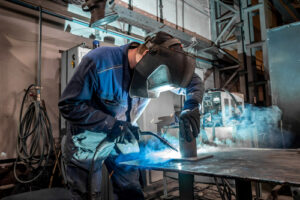 Revolutionizing the Metal Industry: The Role of Custom Metal Fabrication
Revolutionizing the Metal Industry: The Role of Custom Metal Fabrication
Metal Works Corporation is a leading metal machining business that is committed to providing high-quality, precision-engineered metal machining services to its customers. Our company recognizes the immense potential that metal machining has in driving industrial innovation. In this blog post, we will explore how metal machining can unlock untapped potential and drive innovation in various industries.
Metal Machining: A Core Pillar of Industrial Innovation
Metal machining or metalworking is a key process in the manufacturing of various objects, including vehicle parts, machinery components, and tools. In particular, metal machining is vital for the creation of complex, high-quality components found in a range of industries, including aerospace, automotive, and technology.
When it comes to industrial innovation, metal machining plays a critical role in the development of superior, top-quality products. Metal machining is a cost-effective and highly efficient method of creating intricate designs with pinpoint accuracy that is difficult to attain from traditional manufacturing methods.
This level of precision and accuracy makes it a vital process when crafting high-quality components that help to drive industrial innovation. Advanced CNC machines (Computer Numerical Control) further enhance the efficiency and accuracy of the metal machining process. Additionally, metal working provides superior quality products that fulfill the requirements of the manufacturing industry.
Industrial Efficient and Productivity
The efficiency and productivity of any industry are crucial to its success, and metal machining plays a vital part in enhancing these factors. As technology advances, metal machining continues to develop with heightened automation to handle advanced manufacturing projects, thus minimizing downtime and improving productivity in the manufacturing process.
Advanced software, robotics, and the use of CNC machining computers push the boundaries of productivity, enabling mass production of identical parts, while still offering excellent speed and efficiency in industrial manufacturing. Special attention is paid to the lean production principles, which focus on minimizing waste and boosting operational efficiency.
The reduced waste results in better resource utilization, which is critical when looking to reduce the carbon footprint of manufacturing processes. A strong focus on efficiency allows manufacturers to quickly meet customer demands for new and improved products and products created and fulfilled as per the customer’s specifications.
Versatility in Manufacturing
Metal machining is a highly versatile process, enabling the creation of different parts with ease, irrespective of the material and shape requirements. The machining process can accommodate complex structures through techniques such as turning, milling, grinding, and drilling, enhancing manufacturing versatility.
Manufacturers can use the process to create a wide range of parts from small precise medical components to larger agricultural machinery in various industries. Besides, through collaboration between manufacturers and suppliers, further improvements in metal machining can drive greater flexibility in innovation efforts. The iterative process enables manufacturers to come up with innovative products that surpass the current ones available.
Pushing the Boundaries of Technological Advancements
Metal machining drives industrial innovation through technology, which is itself a driving force in the field. Manufacturing industries, governments, and research institutions invest in R&D efforts, driving technological advancements in metal machining. These advancements enable improved manufacturing processes, precision, and automation that drive the potential for innovation.
The aviation industry and the medical sector are two examples where innovation in metal machining is already improving the quality and performance of the products being produced. Recent developments in material science have led to the creation of new alloys with improved properties, including lighter weight components, improved strength, and lower costs. Manufacturers in these industries have utilized these advancements to create better products that are more efficient and better performing than previous designs.
Conclusion
Metal Works Corporation understands the immense potential that metal machining has in driving industrial innovation. We understand that metal machining is crucial for the creation of high-quality, precision-engineered metal parts that are used in various industries globally. Through collaborative efforts between manufacturers and investment in R&D, metal machining is expected to continue driving industrial innovation for decades to come. It is therefore essential for businesses, researchers, and leadership teams to recognize the significance of metal machining and invest in its development, pushing boundaries in industrial innovation. With a cumulative effort, Metal Works, and other companies can create a world where every part of a machine is precision engineered and reliable.

